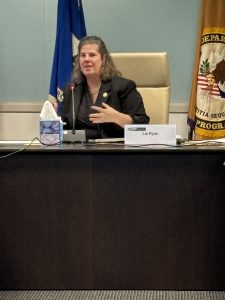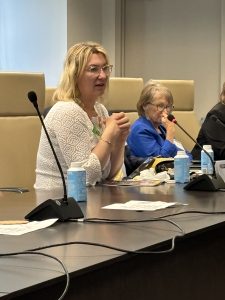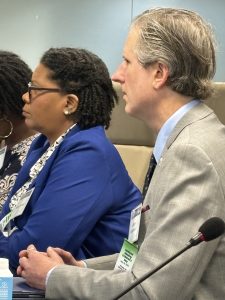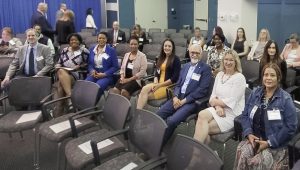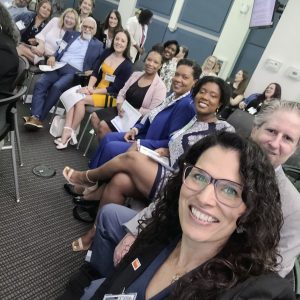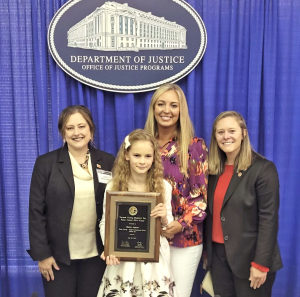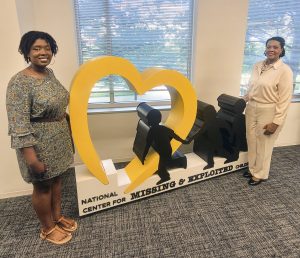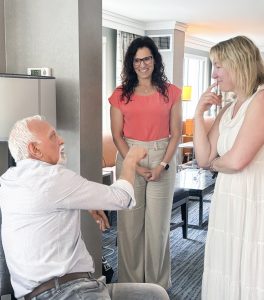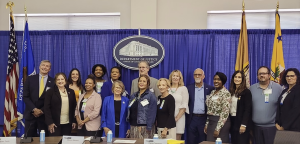
AATTAP-NCJTC staff, family survivors, and program friends who attended the Missing Children’s Day event and OJJDP roundtable discussion are FRONT ROW (from left): AATTAP Administrator Janell Rasmussen; parent survivor Yvonne Ambrose; parent survivor Patty Wetterling; parent-survivor Pamela Foster; and AATTAP Special Projects Associate Helen Connelly. BACK ROW (from left): NCJTC Executive Director Brad Russ; sibling survivor Kimber; sibling survivor Rysa; parent survivor Dr. Noelle Hunter; parent survivor Jeffery Morehouse; sibling survivor Heather; parent survivor Ahmad Rivazfar; family therapist Lillian Ankrah; AATTAP Deputy Administrator Jenniffer Price-Lehmann; Pamela Foster’s husband, Troy Olsen; and AATTAP Project Coordinator Yesenia “Jesi” Leon-Baron.
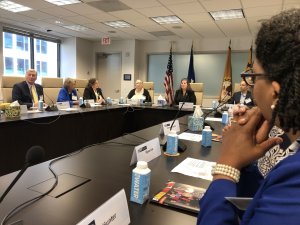
Family survivors, OJJDP leaders, and members of the AATTAP-NCJTC team, meet for a roundtable discussion at OJJDP headquarters after the 2024 Missing Children’s Day event. There, OJJDP Administrator Liz Ryan (shown right center) said, "The emotional toll of a missing child reverberates throughout our communities, impacting parents, caregivers and families—truly, all of us.”
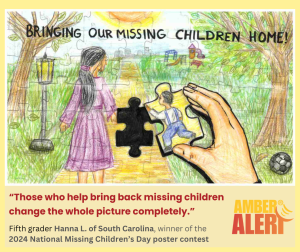
Hanna’s winning poster “adeptly captures the notion that the puzzle is not complete until the missing piece—the child—is back home,” Liz Ryan said during the 2024 Missing Children’s Day. More than 1,300 poster entries were submitted to the annual National Missing Children’s Day poster contest by fifth graders from 30 states. See the winning state posters at https://ojjdp.ojp.gov/events/nmcd/2024-winning-state-posters.
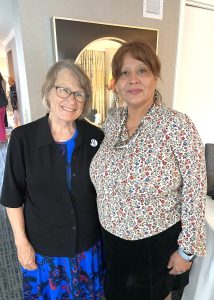
Parent survivors: Patty Wetterling shares a moment with another mother who lost a child to abduction and murder: Pamela Foster. Foster is the mother of Ashlynne Mike, whose 2016 abduction and murder on the Navajo Nation Reservation in New Mexico led to the creation of the 2018 Ashlynne Mike AMBER Alert in Indian Country Act—and AATTAP’s AMBER Alert in Indian Country initiative.
By Denise Gee Peacock
At the 41st National Missing Children’s Day commemoration May 22, 2024 in Washington, D.C., staff members from the AMBER Alert Training & Technical Assistance Program and National Criminal Justice Training Center accompanied family members of missing children who have helped produce two multimedia resources for the U.S. Department of Justice Office of Justice Programs (OJP) and Office of Juvenile Justice and Delinquency Prevention (OJJDP): When Your Child Is Missing: A Family Survival Guide and the forthcoming What About Me? Finding Your Path When Your Brother or Sister Is Missing.
On the day before the Missing Children’s Day commemoration, the AATTAP-hosted family members paid a visit to the Alexandria, Virginia, headquarters of the National Center for Missing & Exploited Children (NCMEC). Afterward they attended an AATTAP reception recognizing them for their contributions to ensuring family members across the nation have access to the latest information and resources. They also were shown highlights of videos that will be featured on the Family Survival Guide website along with the publication once released. (Stay tuned to The AMBER Advocate for more details.)
Recognition and collaboration for better understanding—and a clear path forward
During the National Missing Children’s Day ceremony, the group received thanks for their efforts from U.S. Assistant Attorney General Amy L. Solomon, OJJDP Administrator Liz Ryan, and NCMEC President and CEO Michelle DeLaune—as well as attendee applause when they were asked to stand for recognition. They also heard from nationally revered parent-advocate and retired AATTAP-NCJTC Associate Patty Wetterling, who was a featured speaker at the event. Patty is the mother of Jacob Wetterling, who was abducted and murdered in 1989. (Read more about her search for him, and her new book, Dear Jacob, here.) Wetterling also helped update the new Family Survival Guide.
Following through on a commitment made by OJJDP Administrator Liz Ryan last year during her impactful meeting with the Family Survival Guide contributors at the conclusion of the Missing Children’s Day ceremony, this year’s event included an inaugural, private Family Roundtable meeting during which both Family Survival Guide and Sibling Guide family members discussed their experiences with being a part of these projects, their ongoing needs and goals as surviving family members who have experienced a missing child or sibling, and offered OJJDP and AATTAP leaders recommendations on ways to best support families and more broadly promulgate awareness and distribution of these and other critically important resources for family, law enforcement, community and child advocates.
“The AATTAP was honored to be invited by Administrator Ryan and other OJJDP leadership to facilitate a discussion with the families of missing and murdered children. We discussed ways to improve law enforcement response, preparedness, family support and protecting children. Bringing the important perspectives of both parents and siblings, they bravely and earnestly offered their personal stories and messages of hope for those facing the same unthinkable situation.”
Janell Rasmussen
Administrator, AMBER Alert Training & Technical Assistance Program
Commemoration highlights
Each year, the Justice Department also honors agencies, organizations, law enforcement officials, and others whose exemplary heroic efforts to help recover missing children and prosecute people who harm them.
“Our commemoration is taking a new format this year,” Ryan said. “OJJDP decided not only to highlight the tremendous work of law enforcement others in efforts to protect children, but also to take this opportunity to address the challenge is in this work— to learn more about issues related to missing kids, and hold in depth conversations with youth and families of missing and murdered children and other experts on these related topics.”
Following the commemoration, a cadre of experts, including a youth advocate with lived experience in the foster care system, participated in a panel discussion on the reasons why so many children and young adults go missing from care. “They will suggest ways we can improve collaboration and to ensure the health and well-being of these children,” Ryan explained.
Ryan next recognized “members of family roundtable—parents, siblings and other family members with a loved one who has gone missing. They know firsthand the torment, confusion and emotional exhaustion of losing a child,” she said. “They lived it and they have channeled that sorrow into resources to helping others. Each of the family roundtable members here today has contributed to two important guidance documents."
When Your Child Is Missing: A Family Survival Guide was announced at the 2023 Missing Children’s Day event. The new fifth edition provides a wider range of missing child situations; gives families immediate access to information via its online format; and allows them to hear parents’ advice and encouragement from the parents themselves, who speak directly to them through powerful videos.
As was the case with the Family Survival Guide project, the What About Me? project was developed by AATTAP’s publications team with guidance and oversight from the OJJDP. And both projects where shepherded by Helen Connelly, a former program administrator for Fox Valley Technical College (FVTC)—home to AATTAP and the NCJTC.
The new sibling survival guide will help a missing child’s siblings understand both the emotional turmoil surrounding the crisis and the ongoing search for their sibling. It will offer advice and resources; tips on self-care, mental health, and family dynamics; guidance on dealing with law enforcement, the media, and court; first-hand insight on what to expect and how to cope.
“While more than 1,200 children have come home safely as a direct result of AMBER Alerts, we must not forget that while the system is at work, searching for that missing child, that child’s loved ones are scared, frustrated, and mentally isolated. Providing emotional support to these family members is one of our most important jobs.”
Amy L. Solomon
Assistant U.S. Attorney General
Looking back—and ahead
This year marks the 40th anniversary of NCMEC, which has contributed to the safe recovery of more than 400,000 missing children.
Additionally, the OJJDP is celebrating 50th anniversary of the Juvenile Justice and Delinquency Prevention Act. The law that established our office OJJDP has supported youth and families across the nation, providing federal funds owing to states, territories, Tribes, and communities to protect children prevent delinquency and transform juvenile justice systems.”
“As you know thousands of children go missing in the U.S. every year,” Ryan said. “While most are safely recovered, others are found deceased and never identified. Currently there are more than 1,000 children whose remains have been found, but have not been identified. We want to help name them and return them to their families, communities and loved ones.”
The OJJDP and NCMEC, with support from the DOJ—and training and technical assistance from the AATTAP and NCJTC—will work with state and local law enforcement agencies to identify these children, Ryan explained, adding, “they deserve no less.”
“I’m honored to reflect on our shared responsibility of responding to [cases involving] missing children and supporting their loved ones. And it's especially meaningful to be in the company of parents and family members of missing children. Your presence honors your loved one, and helps represent the thousands of families still searching for their children.”
Michelle DeLaune
President and CEO, National Center for Missing & Exploited Children
Wetterling to DOJ & NCMEC: ‘You Save Lives. You Saved Mine.’
NCMEC President and CEO Michelle DeLaune welcomed Patti Wetterling to speak, recognizing her as “a longtime friend and a personal source of inspiration.”
“Her son, Jacob, who went missing when he was 11 years old, was abducted near their home in Minnesota,” she said. “Patty has given her life to advocating for her son. She has raised a beautiful family. She is a fierce mother and has changed this world with every person she speaks to.”
“We're so honored that you could be with us today,” added Attorney General Solomon. “We’re indebted to you for your years of advocacy on behalf of missing children and for the work that you continue to do to claim a brighter future for our children.”
The following is an excerpt of Wetterling’s remarks at the 2024 National Missing Children’s Day event:
I want to thank you, Liz Ryan, for meeting with the group, this amazing group. [She gestures to the families group attending the ceremony.] I belong over there with you, my heart is with you, and we draw strength from you. And I also want to thank everybody at NCMEC and the DOJ. You save lives, you saved mine.
National Missing Children's Day is an amazing time to shine a light on a dark topic. When my son Jacob was kidnapped, I knew nothing about crimes against children. ‘Who would do that?’ I cried! ‘Who would harm a child?’ It is an unimaginable pain.
After a few days, sleep deprived and depressed, I crawled into bed and pull the covers over my head and decided I'm never gonna get out of bed again. It's too hard. It hurts too much. I can't do it. With tears streaming down my face, I suddenly saw Jacob curled up in a ball somewhere saying the same thing. “I can't do this anymore. It's too hard. They're never going to find me.”
Screaming I got up and said, ‘Hold on Jacob, we will find you! But you have to stay strong!’
I got out of bed. That decision to get out of bed was the first of many choices that we made. And for me, it was in the early days—and 34 years that have followed—I decided I couldn’t live in the darkness, and I chose to seek light. Instead, I chose to fight for the world that Jacob knew and loved—a world that was fair and kind and safe for kids.
When I was given that phone number for the National Center for Missing & Exploited Children, I learned so much about the problem; how many children were missing and exploited and what we all needed to do to bring them home. Most kids come home because somebody is aware of their abduction. They look at the pictures. And if they see something unusual about a child, or a child in a bad situation, they trust their instincts and call the police.
We tried to make sure everybody got Jacob’s pictures. We had to mail pictures out back in 1989. We sent them all over. But my favorite story was when a couple was traveling from Minnesota to Florida, and they thought they saw Jacob. They recognized the picture and said, ‘He was with a man who's very thin and he didn’t look like he wanted to be with this guy.’ But they didn't know who to call. So eventually they called the FBI in Minneapolis. When they described the man that this boy was with the FBI agent knew who they were talking about… they caught up with him in Flagstaff, Arizona. And clearly [the child they found with him] wasn't Jacob.
But one 12-year-old boy got to go home because somebody was aware of the problem. They looked at the pictures and they took that extra step of being there for the child. In those 34 years since Jacob was kidnapped, I've learned that collectively, we are strong when we pool ideas and resources. Through Team HOPE and the family and sibling survival guides. We support each other and offer assistance to other families walking down this difficult path.
When a when a child is missing, it affects the entire world. Classmates, teachers, neighbors, cousins, friends—all have their worlds turned upside down… We have to keep missing children in our hearts until we can hold them in our arms again.
We are all the hope for all missing children, as well as all children who are home safe today. We can never give up hope. And together, we can, and we will, build a safer world for all of our children.


